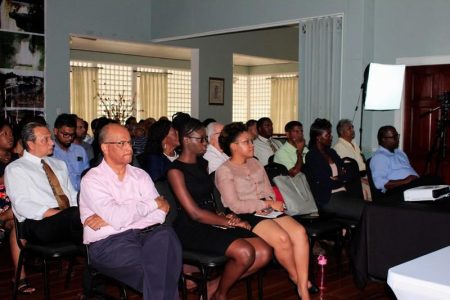-says draft Petroleum Commission Bill not perfect
Even as the need to further enhance public understanding of the oil and gas industry leading up to the commencement of the recovery process in 2020 becomes increasingly important the Stabroek News continues to play an important role in the local reportage on what is “one of the most important occurrences in Guyana’s history,” former Trinidad and Tobago Energy Minister Kevin Ramnarine said earlier this week.
On his way to Berbice on Tuesday to participate in one of a series of public discourses organized by the Georgetown Chamber of Commerce and Industry, Ramnarine told Stabroek Business in a telephone interview that at a time when the local media needed to point the way in the oil and gas public education process, the Stabroek News was doing a “commendable” job. “Your coverage of the sector, up until now, has been both professional and responsible,” Ramnarine said.
Ramnarine, who served as his country’s Energy Minister from June 2011 to September 2015 said, however, that at a time when the role of the media in Guyana’s oil and gas pursuit was certain to become more important there was now a need for training towards the creation of “specialist oil and gas journalists.”

He said that as has been the case in his own country, the challenge of keeping the public as a whole abreast of developments in the sector, the media in Guyana would be compelled to enhance its knowledge of oil and gas and all of its implications for Guyana as the process unfolds. “I believe that this is a necessary investment for Guyana and it will obviously be a shared public/private sector responsibility… There are courses abroad the journalists can pursue and of course there is the possibility of practical exposure to refineries and other oil and gas-related areas. There is a need for local workshops and other forms of training,” Ramnarine said.
Ahead of the commencement of oil and gas recovery scheduled to begin in 2020, Guyana has witnessed visits by various overseas oil experts, the most recent being Ramnarine, who is being hosted by the Georgetown Chamber of Commerce and Industry and Ghanaian Theophilus Nyarko Ahwireng, a former Chief Executive of the National Petroleum Commission of Ghana, invited here by the local Guyana Oil and Gas Association (GOGA) and who on Tuesday, at a public lecture, addressed a number of issues including aspects of the environmental implications of the oil and gas sector.
On Monday, Ramnarine commenced a series of four public lectures in Linden, Berbice, Georgetown and Region Three on the subject of “Oil & Gas Sector Development and the Draft Petroleum Commission Bill” during what is his fourth visit to Guyana this year as a participant in the local oil and gas public education process.
The GCCI, the local entity hosting Mr. Ramnarine’s current visit said in a media release issued last week that the lectures seek to “address pressing questions including how the Guyanese private sector can benefit from the oil and gas sector (and) the implications of the draft Petroleum Commission Bill,” among other issues.
Asked to comment on the crucial draft Petroleum Commission Bill, which, when passed into law will become the foundation on which the all-important Petroleum Commission will be built, Ramnarine said that the Bill was “one of the most important pieces of legislation that Guyana will ever pass.” Asserting that the current draft was “not a perfect bill,” the former Trinidad and Tobago Energy Minister asserted that “work will have to be done to fix it,” Ramnarine said, adding that the Bill “must be transparent so as to win respect.”
Meanwhile, Ramnarine told Stabroek Business that it was of the utmost importance that Guyana move to create a Petroleum Commission in the shortest possible time. “People will have to be hired to do the various jobs ahead of 2020 and that needs to be put in place,” he said. Alluding to the importance of the Commission in the effective management of the oil and gas sector Ramnarine told Stabroek Business that “It has to be credible, gain the respect of Guyanese and the respect of the companies. The Commission must be transparent to probes; it most become one of the most important institutions in Guyana.”
The Petroleum Commis-sion apart, Ramnarine said that the success of Guyana’s oil industry will also be dependent on the integrity of the Ministry of Natural Resources. “The integrity of these two institutions must be held as paramount. Some countries have gotten it wrong, some have gotten it right, Norway being the example that we point to in respect of getting it right and some have been in between. This is a fantastic, once in a lifetime opportunity for Guyana and it is important that we do not get it wrong,” Ramnarine said.





